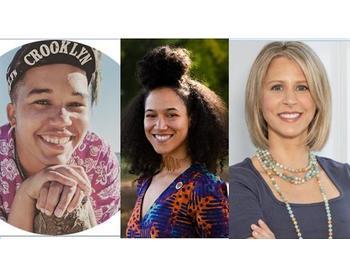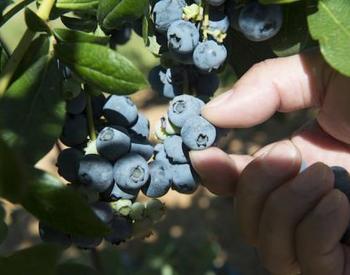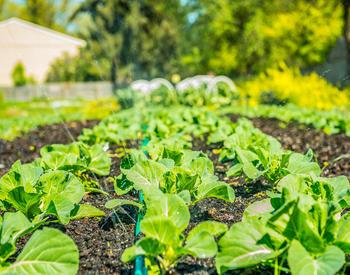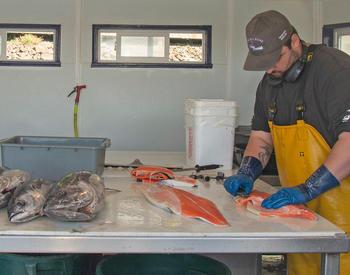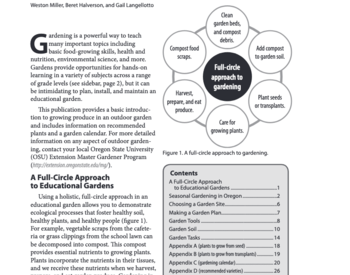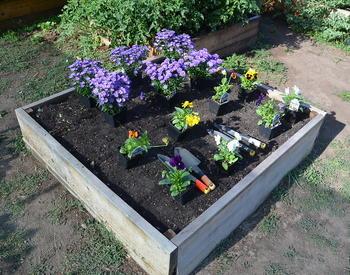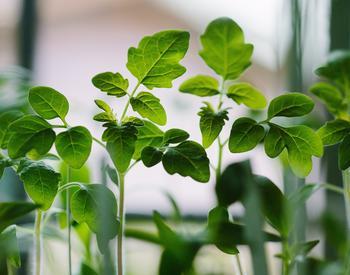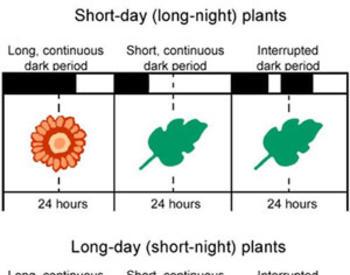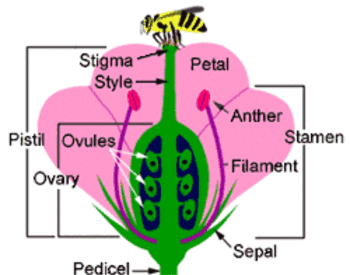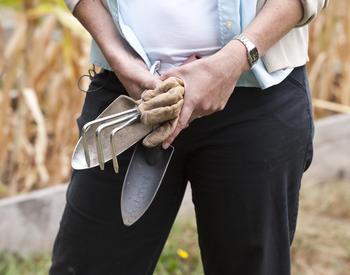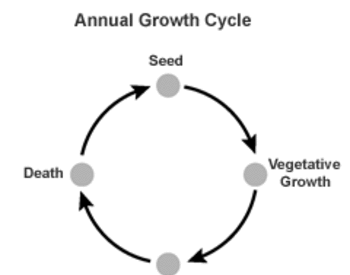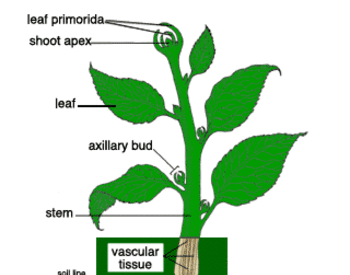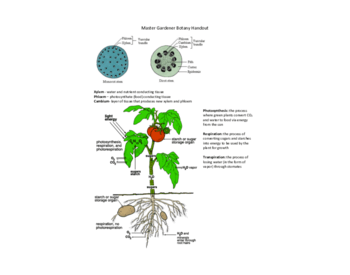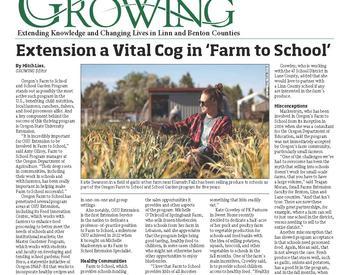Transcript
00:00:07 Rick
Welcome back to the farm to school podcast where you will hear stories of how youth thrive and farmers prosper when we grow, cook and eat delicious, nutritious local food and schools.
00:00:19 Michelle
We're your hosts, Michelle Markesteyn
00:00:21 Rick
And I'm Rick Sherman. We're Farm to Schol Coordinators coming to you from the state of Oregon.
00:00:26 Michelle
And this is an exciting episode. This is number two of four where Rick was on assignment at the 2nd biannual growing School Garden Summit in San Diego, CA.
00:00:37 Rick
Yep, that is exactly correct. More of the same. We'll have three exciting guests to share with you. So let's get started.
00:00:47 Rick
So I'm here with Kaitlyn.. and Kaitlyn, you have a very similar name to mine. But it's different. So what is your name?
00:00:58 Kaitlyn Scheurermann
Yes, so it's “Sharman”
00:01:00 Rick
And mine is Sherman, but hers is spelled with a whole lot more letters. And where are you located at?
00:01:14 Kaitlyn Scheurermann
Yes, so. I work for the Waukee Community School District in Iowa.
00:01:18 Rick
Iowa, and I don't think I've ever been to Iowa- go Hawkeyes, I guess, right?
00:01:24 Rick
No, I would say OK, alright, that's good to know. OK, I hold no affinity. So yeah. So and sorry to offend any Hawkeyes or…
00:01:25 Kaitlyn Scheurermann
Yeah, yeah.
00:01:34 Kaitlyn Scheurermann
It's alright. We have hawkeyes and cyclone fans in our house so.
00:01:37 Rick
Cyclones, OK. Yeah, we have that in Oregon too. House divided and stuff. So. OK, so what do you do there?
00:01:47 Kaitlyn Scheurermann
Yes. So I'm the registered dietitian for our district. So I work for our Nutrition Services department and a portion of my role is coordinating our farm to school work.
00:01:55 Rick
How does that work into that into the your nutrition work? That's interesting. Tell me more.
00:02:01 Kaitlyn Scheurermann
Yeah. So we our program has kind of three prongs to it, so, we do hands on agricultural experiences for students, which is our school gardens, hydroponics, Vermacomposting, egg hatching, lots of different things. We also do nutrition education through some different Wellness programs and then we also do a lot of local purchasing so we have a harvest of the month program and state initiatives around local purchasing.
00:02:15 Rick
Ah, good. Very nice. OK, now are you at district level you have many schools do you have?
00:02:32 Kaitlyn Scheurermann
Here we have ten elementary buildings, five middle schools, and two high schools. And then we are very rapidly growing districts. So we add about four to 500 new students every year. We're the fastest growing district in the state of Iowa.
00:02:44 Rick
OK. Would you consider yourself more urban, rural?
00:02:57 Kaitlyn Scheurermann
Kind of, yeah, a suburban mix, I would.
00:03:01 Rick
All right, good deal. And so do you have school gardens at all of your schools?
00:03:03 Kaitlyn Scheurermann
We're not quite at all of our buildings yet. We have 6 outdoor spaces and then another 8 hydroponic spaces and some buildings have both an outdoor space and an indoor hydroponic space.
00:03:18 Rick
OK. What do you think the biggest take away in terms of what you do in terms of like how you see kids lives transform through just outdoor learning and space, anything what do you see that really excites you about?
00:03:38 Kaitlyn Scheurermann
That, I think what really excites me is a lot of our kids don't have access to outdoor spaces or their families aren't gardening at home. And so sometimes, like kids, are touching a seed for the first time when they are in our garden spaces. They've never planted one before. They've never seen it. And so it's just really exciting to get to see kids getting that really hands on immersive experience in learning where their food comes from.
00:04:05 Rick
OK, good. And so do you see yourself in in the same position in five years from now, 10 years from now or growing or how could the program grow?
00:04:17 Kaitlyn Scheurermann
Yes, I mean, I love our district. I love where I'm at. We have incredible people that are super passionate about the work that they do. And doing what's best for kids. And so I'm so grateful for that. I would love to see our program grow more. See a dedicated position with farm to school. I think there's so many leaps and bounds that we could move towards if we had something like that in our district.
00:04:46 Rick
And so you work with your nutrition services department. I think it's so great when a nutrition service department actually takes the initiative to get involved in farm to school, school gardens and it's pretty rare. We have a few people that I interview, and I will I have on my list of people interview so I just I love that. I mean, I was a food service director for 32 years and I always say that I was the…. Well, let's just say I was very passionate about Farm to school and it took over my life in a good way. And like I grew into this job, I'm an estate agency and I wanted to do good at a state level or national level even, you know, rather than continuing what I'm doing. And it all starts with like somebody like that that gets the seed, get it? It gets the seed and and and does that. So I really I'm so glad that you're involved in that.
00:05:51 Kaitlyn Scheurermann
What was your favorite part of being a food service director?
00:05:56 Rick
You know, Farm School was actually, that was so weird and really, farm to school wasn't a thing when I started. I like I said I did. I did food service management for 32 years and so before it was like I would do things outside of work like culinary competitions for kids and just to see that I wanted to teach them something. And like I did a program and it took off and did really well, and that was that was really fun and stuff. But then about 2009, the movement started happening and just to be able to like, teach kids where their food comes from was like really ignited something in me personally. So I really can resonate with what you all are saying at this conference and stuff.
00:06:46 Kaitlyn Scheurermann
Yeah, yeah, I think it's just such a unique opportunity for kids in touch with their food being a registered dietitian like I'm very passionate about food and I love cooking and knowing where food comes from. And I know not everybody shares that same passion. But you know, just seeing kids like that like spark ignite and click things click in their brain about where their food comes from.
00:06:53 Rick
I think so too.
00:07:11 Kaitlyn Scheurermann
It's just so powerful to build their relationship with food.
00:07:16 Kaitlyn Scheurermann
00:07:17 Rick
Well, I think that's really important too. And like I work with a lot of dietitians in and that are specialists that do, you know, a lot of, a lot of people in the school food arena that are dietitians but not too many of them work in the school garden realm. So our farm to school realm so I really thank you for that. OK, well, Caitlin, I really want to thank you for being here today and sharing your story and your passion. And I look forward to seeing more from you in the future, hopefully in another conference or something. So thanks and nice to meet you.
00:07:37 Kaitlyn Scheurermann
Yes, thank you.
00:07:59 Rick
So I'm here with Selma Sims and Selma. you're from the Chicago land, right? Chicago, IL. Please tell me a little bit about yourself.
00:08:04 Selma Sims
OK, so my name is Selma Sims. I'm the CEO and head grower of gardeneers and gardeneers is the only full service, customized school garden nonprofit in the city of Chicago. Now, our work is primarily done on the South and West sides because of systematic historical things that have happened, and most of those areas are considered food deserts by USDA, and so the work that we do is weekly we have Garden educators who are trained in both agriculture as well as classroom facilitation. They team up with AmeriCorps service members, and they facilitate weekly garden program with anywhere between 2 to 3 schools per week. We have a team of about 30 people, so we serve 22 school and community based partners, 21 schools. We have one community organization partner. The boys and Girls Club, specifically the James Jordan Boys and Girls Club and we do that programming with students and our primary focus is our pillars are nature, nutrition and community. And so we do a lot of school garden programming. We do gardening, harvesting, but we also take that food that we grow and we utilize it in our programs with our youth because they love picking the food that they grew and we also give it away at farm stands to the community, the school community. And we also put some of our produce and community refrigerators, which we call in Chicago, love fridges. So that's what we do.
00:09:32 Rick
I've heard that there was some operations in Portland that I just heard about that had some community refrigerators and things kind of a new thing.
00:09:39 Selma Sims
So they're popping up everywhere. And so we have a great relationship. I want to get a better one. But you know, that will come over time because relationships are important to me. But making sure that we can put food within our community and it doesn't go to waste. The love fridges or the community refrigerators allow us to do that because sometimes there is produce left after Farm stands, or maybe we harvest on a day where there are no youth or parents aren't coming that day, but we don't want the food to waste in the garden. So being able to put it there where the community has free access to it, especially knowing that most food that is donated or given away as surplus is probably a non perishable, it's probably high in preservatives being able to put fresh produce within our community is really important.
00:10:26 Rick
So, Selma was speaking in our general session just a little bit at the growing school garden summit here. And I had to get her on the on the air, as it were. So you spoke about you have how many staff members working for you 2020?
00:10:40 Selma Sims
Right now we have 13 staff members. We have about 20 AmeriCorps members, but we have a team of about 30. Given what time of the year we're in.
00:10:48 Rick
And are they all volunteers?
00:10:50 Selma
Nooo ..
00:10:53 Rick
Tell me a little. I knew that.
00:10:54 Kaitlyn Scheurermann
I know you know. And I appreciate that, Rick. No. So no, everyone that is on my team, with the exception of volunteers that sign up their compensated right so our AmeriCorps service members received a stipend and that is negotiated when they sign up based off their experience. But the great thing about AmeriCorps is you need no experience to be one. So we take everyone and our staff members. They are they are salaried employees with the exception of one person who's HR. He's part time, but everyone else's salary because I'm required to give insurance. No, I can't. It's a justification. Like, hey, I need this extra money because this person's full time state mandates we have insurance. I need supplemental funding. And so everyone on my team is compensated.
00:11:42 Rick
And I loved to hear you say, like how, you know, they have to love what they're doing and love and love their pay and everything and. And so how do you go about doing that? How do you fundraise and do those things to get those people compensated?
00:11:58 Selma Sims
Awesome. So yes, everyone on my team, they love the work. It is a job, of course. And we believe in a diversified funding model where we do conventional things like other nonprofits, such as applying for different government grants and foundational grants. But we also believe in just making sure our diversification of funding is there because if you've been in the nonprofit industry, at least for like the last three to four years, you know, at any given moment of funder could pivot their priorities, and now you're just kind of you're in the wind hoping to find something to supplement that. So we diversify by not only just doing grants. We had a fundraising events. We lean into individual donors and when we say individual donors, not just those donors that can donate cash. However, we take anything, whether it's physical labor, whether it's a qualified charitable gift, whether it's bringing your job for corporate volunteer day that's sponsored, right, all of these different. That's one of my favorite platforms and I'm not sponsored one day is we actually utilize free will, which is this platform that allows people to give non cash gifts such as you can be written into someone's will. I love that.
00:13:10 Rick
That I heard you say that and that was so intriguing and somebody that's like, you know, someday I want to have a legacy. Like you were saying.
00:13:13 Selma Sims
And I don't want to see my dollars change right now, but I do want to have an impact and make sure and make sure this works continues, even though I'm not here to see it. Yes, that's very important because there are a lot of folks who want to support this work. They just don't know we're here.
00:13:23 Rick
Yeah, I can't take it with me.
00:13:35 Selma Sims
And they don't know how to. And so just making sure folks know, hey, you don't have to see a dollar leave your checking account today.
00:13:42 Selma Sims
But how about this? This is what - It's all about relationships.
00:13:45 Selma Sims
It's about relationships because please don't walk up to somebody you just met and say, hey, write me. You will. No, don't do this. Do this to anybody, but make sure you're building those relationships with folks who do have the capacity. You not only have the capacity, but want to do it.
00:14:01 Rick
If there's one thing you'd want the people in the world to know about what you do, what is it?
00:14:10 Selma Sims
I had the greatest team in the world. That's one thing, but I do have the greatest team in the world and I'm blessed to have them because we would not be able to do this work and everything that we've been able to do over the last 10 years, because this is actually our 10th year doing this work, I'm super happy and super proud. And at the same time, knowing that I appreciate and value my team, I have to make sure as a leader, as a business leader, that I'm compensating and paying them equitably to stay here. Because I mentioned earlier intellectual property, intellectual capacity in this type of work. Having people that can do not only agriculture or gardening work as well as facilitate.
00:14:39 Rick
Yes.
00:14:50 Selma Sims
Education programming to K through 12 students and build communities when within schools. That's not an easy feat. That takes time, that takes practice, that takes folks really leaning into it and I don't want to have a person learn all of that and then one year they're leaving me because I did not take care of my team.
00:15:10 Rick
Somehow I feel that isn't going to happen on your watch. No, no. I wish I could work for you. Yeah, right on. Yeah. Well, yeah. Well, thank you so much for being with us. I really appreciate getting to meet you. So thanks for being on the show.
00:15:13 Selma Sims
Thank you for having me! likewise, thank you Rick
00:15:31 Rick
So I'm still at the growing school garden summit and I'm talking to Pam Hosimer from Maryland. So Pam, please introduce yourself and tell me what you do. Pam is also a fellow master Gardner. OK, like, I am too.
00:15:43 Pam Hosimer
I am. I am. Thank you. I am a snapped nutrition educator with the University of Maryland extension in Montgomery County, Maryland, Montgomery County. I teach in 12 different elementary schools, and support their school gardens.
00:16:03 Rick
OK, wow. So what happens at those 12 schools and how many students are we talking about?
00:16:13 Pam Hosimer
Well, I think that I am currently supporting about almost 3000 students at my schools. And the way this works is that I form a collaboration with a school that has a we work with schools that have a 50% or greater free and reduced meals rate to work with our snap-ed program and then we work, we have a collaborator agreement with them and then I work with the principals and we decide what of my resources are best utilized at the school and I teach nutrition education class.
00:16:46 Rick
Gotcha.
00:17:05 Pam Hosimer
At in the grades that they asked me to teach in. So, for example, one school that I work with, they have about 1000 students and I work with their first grade and I teach there. I support that teachers to teach the read for health curriculum and have a school garden activities and each month I bring in food for them to have a tasting for all seven of their first three classes.
00:17:39 Rick
And what that like? What are what's a typical day when you come in there? What are some of the things that happen?
00:17:48 Pam Hosimer
It for me in the schools I go in like I will trace in that that school I trained the teachers so that I drop off the food and supplies for their lessons and then they teach them so early in the morning I'll be dropping off school, some supplies to them. Then I will be back at the office. And I might be supporting our Community Schools and planning for their lessons. And then I'm working with school gardens, so I might be talking to teachers and reaching out to them about what garden options they want to have and then have a meeting with the school to plan their school garden. And then in the evening I could do family event with a couple 100 people coming to the event and I will bring in our Master gardener volunteers to help support the event and I also bring in Farm Bureau volunteers to help support the event with their education programming.
00:18:35 Rick
Ohh wow. OK, what's the one thing you would like everybody out there to know about what you do in and like something that excites you about your job?
00:19:03 Pam Hosimer
One thing that excites me about my job is working with the school gardens and bringing in fresh produce for the students to taste because it's so funny that sometimes it's students haven't tasted something as basic as a strawberry or a blueberry it, it never ceases to amaze me.
00:19:10 Rick
Yeah, yeah.
00:19:23 Pam Hosimer
That I bring in those two fruits. And half the class has never tried them. Oh my. Gosh, and I think that's one of the reasons is because we have Montgomery County is Maryland is one of the most diverse counties in the United States. And so we have a lot of people from a lot of different areas and so that that might not be their first choice to try at the grocery store, especially since a lot of my families have limited funds and so they may reach for something that they're more familiar with from, you know, from their heritage and their culture. And it may be Strawberries and blueberries.
Rick
Yeah. So we take that for granted. It's just like, oh, everyone has had those. I mean, I picked them as a youngster for a living, so to speak, you know. But yeah, it and I matter of fact, I ate so many. I I don't really care for strawberries.
00:20:12 Pam Hosimer
Right.
00:20:22 Rick
I'm like a very strange person that I ate too many as a youngster, so I really, yeah, you do take that for granted.
00:20:28 Pam Hosimer
Right in the farm, that's just a 2 miles from my house.
00:20:31 Pam Hosimer
They have pick your own blueberries and strawberries. Yes. So you know, it seems ubiquitous that that, that's something that everybody would do, but they don't. So that I love to expose the kids and have them try new foods. And I love to have them come to the master gardener demonstration garden.
00:20:40 Rick
Yeah.
00:20:50
Hmm.
00:20:51 Pam Hosimer
Last year I had 400 and 51st graders come to a program with my snapped lessons and the Master Gardeners gave tours. Yeah, and it was really successful. So we're expanding that.
00:21:04 Rick
This year. OK well.
00:21:05 Rick
That's great. Well, thank you so much, Pam, for taking the time and come over and saying hello to everybody out there and look forward to seeing you again. I've, I've seen you for years at conferences and stuff, so it's good. Good to see you again. All right. Thank you.
00:21:17 Pam Hosimer
Oh yeah, yeah.
00:21:20 Pam Hosimer
Thank you so much. Uh-huh.
00:21:30 Rick
Hey everybody. We'd like to thank all of our guests for being a part of our show and thank you for listening.
00:21:35 Rick
Today.
00:21:35 Michelle
Wow, what a gift to hear folks share their stories.
00:21:39 Michelle
Farm to school was written, directed and produced by Rick Sherman and Michelle Markesteyn, with production support from Leanne Lochner from the Oregon State University.
00:21:49 Michelle
This podcast was made possible by a grant from the United States Department of Agriculture.
00:21:54 Rick
The content and ideas on the farm to school podcast does not necessarily reflect the opinions of Oregon State University, Oregon Department of Education, and the United States Department of Agriculture, the USDA, Oregon.
00:22:08 Rick
Department of Education and Oregon State University are Equal Employment providers and employers.
00:22:15 Michelle
Want to learn more about Farm to school? Connect with us? You can check out other episodes, show notes, and send us your ideas for other episodes at Farm to schoolpodcast.org. That's all one word farm to schoolpodcast.org.
00:22:32 Rick
We would love to hear from you too, so stop by the website just mentioned to say hello or give us an idea for a future podcast.
00:22:40 Michelle
Thanks everyone for listening.
00:22:41 Rick
Thanks everyone. Bye.
Join Rick "on assignment" as he travels to the Growing School Gardens Summit, in San Diego California. Rick interviews a dozen people with amazing stories. This is part two of a four-part series.
Guests include:
Kaitlyn Scheuermann, MPP-D, RDN, LD [email protected]
Waukee Community School District, Waukee IA
Selma Sims [email protected]
CEO, Gardeneers, Chicago Ill
Freewill Legacy
Pam Hosimer [email protected]
Senior Agent Associate, University of Maryland Extension
The Farm to School Podcast is produced by Rick Sherman, Farm to Child Nutrition Program Manager at the Oregon Department of Education and Michelle Markesteyn, Farm to School Specialist at Oregon State University Extension with production support from LeAnn Locher, OSU Extension. The show is made possible by a grant from the United States Department of Agriculture.
Want to connect? We’d love to hear from you!
